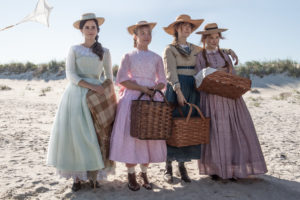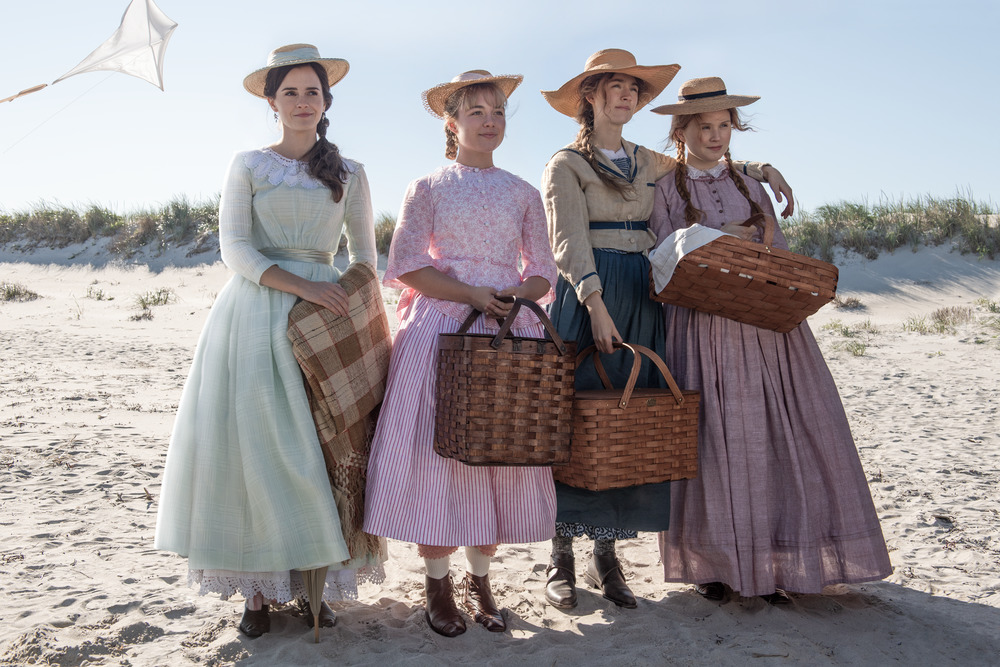Movie Info
Movie Info
- Director
- Greta Gerwig
- Run Time
- 2 hours and 14 minutes
- Rating
- PG
VP Content Ratings
- Violence
- 1/10
- Language
- 1/10
- Sex & Nudity
- 1/10
- Star Rating
Relevant Quotes
A capable wife who can find?
She is far more precious than jewels.
Above all, maintain constant love for one another, for love covers a multitude of sins. Be hospitable to one another without complaining. Like good stewards of the manifold grace of God, serve one another with whatever gift each of you has received.

Was it only last March that I reviewed director Clare Niederpruem’s version of the classic novel about the 4 Marsh sisters, which she transferred to a setting in the 21st century? Louisa May Alcott’s beloved novel has been the source for movies almost as long as movies have been around, two versions having been released in 1917 and 1918. What long remained the definitive version starred Katherine Hepburn as Jo in 1933. Then there was the popular MGM 1949 version starring 31-year-old June Allyson as 15-year-old Jo, and in 1994 Gillian Armstrong’s version with Winona Ryder as Jo and Susan Sarandon as Marmee. In 2017 PBS produced the fullest version of the novel, a 3-hour 2-part miniseries, and now we have the adaptation by Greta Gerwig, the actress who directed the much-praised Lady Bird two years ago.
The director-writer keeps the Civil War era setting but manages to make it feel very modern by adding some of Louisa May Alcott’s tussle with her paternalistic publisher over her novel. Gerwig upends the book’s chronology and shows that Amy also fought against a patriarchal society thwarting her dream of becoming a great artist. As the film begins we encounter this misogyny immediately, with the grown-up Jo (Saoirse Ronan ) opening the frosted-glass door of a New York publishing house and walking by a row of desks where men in black suits sit looking over manuscripts. She stops at the desk of Mr. Dashwood (Tracy Letts), telling him that she has a “friend’s” story to submit. He can tell very well by her ink-stained fingers who the actual author is. He hastily reads, or rather, scans, the pages of the manuscript, slamming each page down with a loud bang. To intimidate her? Saying that he is interested in the story, he patronizingly tells her that if “the friend” submits more material and “If the main character’s a girl, make sure she’s married by the end. Or dead. Either way.”
Before switching back 7 years to Jo’s family life in Massachusetts, we see that she is living in a New York City boarding house where Friedrich Bhaer (Louis Garrel), a language professor from France (instead of the novel’s Germany) also lives. Becoming friends, she asks him to read and critique one of her adventure stories. Instead of receiving the glowing praise bestowed upon her by her family, Friedrich gently tells her that she should write about what she knows. Unused to such blunt honesty, she rejects his good advice and breaks off their contact.
The film frequently moves between the present (young adulthood) of the four girls and their genteel, impoverished teenage years in Concord where they were watched over by their kind and loving mother, their abolitionist father away serving as a Union Army chaplain during the Civil War. Meg, the oldest and most conventional sister, is played by Emma Watson, Florence Pugh is the hot-headed Amy, and Eliza Scanlen the delicate, gentle Beth. Laura Dern is their mother, Marmee, who keeps peace among the sometimes-warring girls and nurtures and encourages their creativity.
Up in the attic the four sisters delight in staging the adventurous plays that Jo writes. Individually, self-centered Amy aspires to be a famous painter; and the frail Beth is a gifted pianist. Docile Meg, who had once desired to be an actor, settles for a loving and happy marriage to John Brooke (James Norton). In and out of their lives is the wealthy Aunt March (Meryl Streep), who has given up on would-be writer Jo’s refusal to settle for marriage. When she drops Jo as her traveling companion for her trip to Europe, choosing Amy instead, Jo is momentarily devastated. The Aunt never ceases to try to convince one of the girls to marry a wealthy man so that the entire family will be supported.
There is a recurring rivalry between Jo and Amy, as shown in the scene when, after an intense argument, the vindictive Amy hunts for her sister’s manuscripts while their author is out of the house, and upon finding them, burns them all. When Jo returns, only Marmee’s intervention prevents the enraged Jo from doing bodily harm to her cruel sibling. Later, when the boy next door Laurie (Timothée Chalamet), who had been inducted into the sisters’ dramatic club, proposes to Jo and is turned down, he then asks for Amy’s hand, and she also rejects him, complaining that all her life she had been second to Jo, living in her shadow.
Virtually all of the familiar and beloved incidents are included—the sharing of the family’s Christmas breakfast with the neighbors down the road, even poorer than the Marsh’s; The rescuing of Amy when she falls through the ice; Amy’s society debut; the befriending of Laurie’s lonely grandfather Mr. Laurence (Chris Cooper), who at first invites Beth to come and play his piano any time; and then his surprise gift of it to her.
There are so many warm and glowing scenes—Jo pours out her loneliness to Marmee, well aware that it is the cost of her striving to stay independent of a man; and Amy has her moment when she declares that she is giving up her aspiration to become a painter because she realizes her talent is not enough to make her a great one. For her it is all or nothing. And of course, there is the matter of Beth’s illness, which for a moment we are led to think has been overcome—Jo’s love and longing for her little sister is so great that upon her hasty return from New York to help nurse her, she thinks she can will her recovery.
When Jo, at last following the path that Friedrich had advised her to follow—write about what you know—produces her novel based on her family, she again faces Mr. Dashwood. She struggles with his demands for some changes, as well as publication decisions—to accept a low price for outright acceptance or a potentially larger royalty (far less than the usual one given to male writers), as well as whether to keep the work copyrighted in her name. All decisions that few, if any, women were faced with in 1868. I was wondering too, whether Friedrich would reappear, the movie obviously approaching its climax, or would his reunion with Jo be dropped from this version? I will leave it for you to discover how screenwriter Greta Gerwig dealt with this and still maintain her feminist take on this age old but ever fresh story.
This has always been regarded as a girl’s story, but it need not be just for them. It is so timeless that men too who love families and share a vision of a world in which all are equal will enjoy it. This is perhaps the most energetic of the many versions that I have seen, the dancing so robust, the feminist sentiments so strongly argued, and Amy given a more sympathetic depiction than before. The cast is absolutely terrific. Although Saoirse Ronan justifiably receives the lion’s share of the credit, the others are excellent as well. Especially Florence Pugh’s more rounded portrayal of the selfish Amy and Timothée Chalamet as the love-stricken Laurie. It is always a delight to see scene stealing Meryl Streep, no matter how small the role, as it is to see one of my favorite actors whom I first encountered in John Sayles’ classic union film Matewan, Chris Cooper as the long=grieving grandfather. What poignancy he displays as he sits on the stairway of his mansion unobtrusively listening to Beth skillfully playing the piano once belonging to his deceased daughter, whom he observes would have been Beth’s age had she lived.
With Gerwig’s fresh take bolstered by gorgeous costumes, cinemaphotography and music, this is a “must see” movie for all who are looking for a film that will make them feel good about life and family relationships.
This review will be in the January issue of VP along with a set of questions for reflection and/or discussion. If you have found reviews on this site helpful, please consider purchasing a subscription or individual issue in The Store

